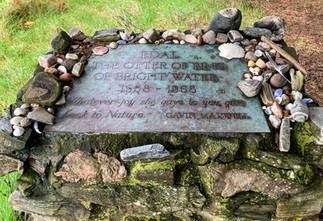Gavin Maxwell's Otter Trilogy: A Literary, Cinematic, and Ecological Odyssey
- David Ruthven
- Aug 16, 2023
- 3 min read

Introduction: The Life of Gavin Maxwell
On the West Coast of Scotland, amidst the rugged landscapes and untamed beauty, lived a man whose deep connection to nature and passion for wildlife would weave the fabric of his literary legacy. Gavin Maxwell, a Scottish writer, naturalist, and adventurer, embarked on a unique journey that transcended the boundaries of conventional literature. Born on July 15, 1914 in Elrig, Wigtownshire, Maxwell's life was marked by a profound love for the natural world and a commitment to preserving its treasures.
Maxwell's most renowned contribution to literature is his otter trilogy, a collection of works that encompasses "Ring of Bright Water," "The Rocks Remain," and "Raven Seek Thy Brother." These books not only captivated readers with their poignant narratives but also left an indelible mark on the literary, cinematic, and ecological landscapes of the 1970s and continue to resonate with relevance in our modern times.
Literary, Cinematic, and Ecological Impact in the 1970s
During the 1970s, a period characterized by social change and growing environmental awareness, Maxwell's otter trilogy emerged as a beacon of literary brilliance and ecological consciousness. "Ring of Bright Water," the first installment of the trilogy published in 1960, introduced readers to Maxwell's enchanted world in Sandaig near Glenelg on the Kyle Rhea the thin strip of water that separates The Isle of Skye from the mainland, where having bought the run down house called Camusfeàrna he lived an inseparable bond with an otter named Mijbil. This heartwarming tale of human-animal companionship struck a chord with a generation seeking emotional connection and a renewed relationship with nature.

The trilogy's success extended beyond the written word with the release of the film adaptation of "Ring of Bright Water" in 1969. Directed by Jack Couffer and starring Bill Travers and Virginia McKenna, the film brought Maxwell's enchanting narrative to the silver screen, captivating audiences with stunning visuals that mirrored the remote landscapes of West Coast Scotland. The film's success not only propelled Maxwell's literary fame to new heights but also introduced his ecological message to a wider global audience. Maxwell died in September 1969 at the early age of 55 after suffering from lung cancer but lived just long enough to witness the first screenings of this classic British film.
His best loved novel - Ring of Bright Water - is well illustrated with images from the authors life at Sandaig and his otter Mijbil
From an ecological standpoint, Maxwell's trilogy gained heightened significance against the backdrop of growing concerns about environmental degradation. The exploration of the otter's life and habitat in his works shed light on the delicate balance of nature and the repercussions of human interference. Maxwell's prose and the film adaptation inspired conversations about conservation, animal welfare, and the importance of safeguarding our planet's natural treasures.
Relevance Today
In an era marked by escalating environmental challenges, Maxwell's otter trilogy remains a poignant reminder of the interconnectedness of all life forms and the urgency of safeguarding our planet's biodiversity. The enduring impact of the film adaptation continues to bring Maxwell's story to new generations, fostering a sense of wonder and appreciation for the natural world.
Moreover, Maxwell's ability to weave scientific insights seamlessly into his narratives underscores the relevance of his work in today's world of environmental discourse. As the global community grapples with climate change, habitat loss, and species extinction, Maxwell's emphasis on understanding and respecting the natural world takes on renewed significance.
Maxwell's House "Camusfeàrna" at Sandaig as it was in 1958 (left) and (centre) as it is now after a fire destroyed it in 1968. The memorial to Maxwell at Sandaig (right)
A Lasting Literary, Cinematic, and Ecological Legacy
Gavin Maxwell's otter trilogy, elevated by the success of its cinematic adaptation, transcends time and space, bridging the gap between literature, film, and ecological awareness. His eloquent prose, evocative visuals, and profound insights into the natural world have left an enduring imprint on both the literary canon, cinematic history, and the collective environmental consciousness. As readers and viewers continue to journey through the pages and screens of Maxwell's works, they are invited to embrace their role as stewards of the Earth, mirroring the writer's deep reverence for the untamed beauty that surrounds us.
Further Reading & Related Links:
http://www.maxwellsociety.com/Biography/Artists.htm
Selected works by Gavin Maxwell in our Bookshop:











Comments